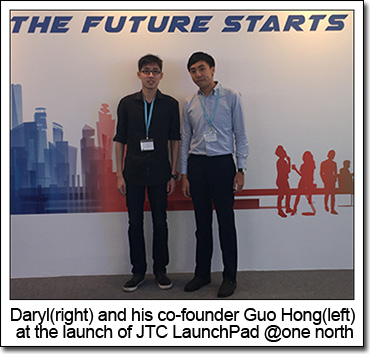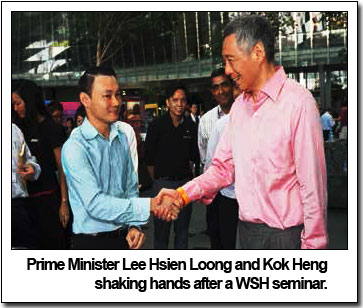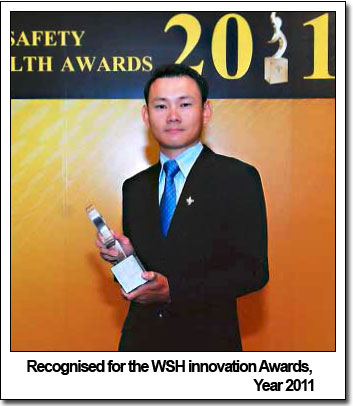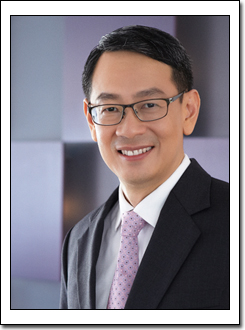ALUMNI STORIES
DARE Alumnus sold tech start-up for more than $1 Million at age 26

Co-founder of RC9, Daryl Png graduated from Singapore Polytechnic in 2010 with a Diploma in Aeronautical Engineering. RC9, started in November 2013, is a digital platform where customers can compare and book rental cars in more than 7300 locations across 150 countries worldwide through a mobile app or online web. Collaboration with major car hiring companies enables RC9 to fulfill its vision of providing secure and affordable car rental anytime, anywhere. As at 2017, RC9 currently houses more than 35 car rental companies. RC9 was fully acquired for SGD1.59M in December 2016.
“It is possible to fly without motors, but not without knowledge and skill”. This famous line was from the famous aviation pioneer, Wilbur Wright in 1900. Taking this to heart, Daryl honed his knowledge and skills throughout his time in SP. One major lesson he learned is the understanding that certain outcomes could be altered remarkably by external circumstances or uncertainty even though one seems to do everything by the book. Understanding the wonders of aerodynamic forces and external factors such as the wind and gravitational attraction of the earth in depth, could influence how one would conduct a flight. Likewise, in entrepreneurship, there are environmental, psychological and socio-cultural factors that could heavily affect an outcome. In addition, being versatile is an important trait Daryl picked up in SP, and constantly practising has helped him in better decision making.
RC9’s success story has been used as a business case study in Nanyang Technological University (NTU)’s Master of Science in Technopreneurship and Innovation Programme. RC9 also collaborated with National University of Singapore (NUS) students on building large-scale application software.
Having successfully sold RC9, Daryl is now a Product Evangelist at AIG and is currently doing the Global Graduate Development Program at AIG. This program aims to develop and grow young talented individual to be leaders of tomorrow.
EMBRACING LIFE'S ENDLESS POSSIBILITIES

Lim Kok Heng graduated from Singapore Polytechnic with a Diploma in Manufacturing Engineering in 2002. He now works as the Operations Manager of Easteel Services (Malaysia) Sdn Bhd.
Before Kok Heng met his mentor at SP, life was uneventful for him. What really changed was waking up and looking at challenges differently.
Q: How did your life and perspectives change after coming to SP?
Before SP, I went from primary school to ITE after completing my N-levels. Upon joining SP, I realised that good grades alone is not enough. I was lucky because I met Ms Vicky Quek, a Student Development Officer, who played an instrumental role in ensuring my personal development.
Because of Ms Vicky Quek's early guidance, I recognised the importance of developing personal qualities such as self-reliance, perseverance and a sense of responsibility to oneself and the society. I took an active part in CCAs which included a wide range of activities, from organising events to helping out in community service. Through these activities, I was able to develop numerous positive personal qualities. In September 2002, I was awarded the National Youth Achievement Award (Gold) for excelling in CCAs and was also recognised as a SP model student.
Q: What motivated you to further your studies? What was the best lesson learnt?
In today's environment, being equipped with a diploma is inadequate; furthering my studies not only provided me with the exposure to latest trends and knowledge and gain the necessary skillsets to stay relevant, but also contributed to my sense of self-worth. Supported by working experience, a relevant qualification gives me a competitive edge and helps in my promotional opportunities.

Q: Why do you enjoy what you are currently doing?
Life is about making choices. Experiences help you to grow and that's why I enjoyed the job rotation which my company offered. About once in every two years, I would switch roles. So far, I have covered safety and health, quality, process improvement, production planning and control, engineering and maintenance and production. I am really thankful to be in an organisation that is so supportive of continuous learning.
Life is about attitude too. I was taught to see things differently. For example, we face technical difficulties such as machine breakdown, as well as, process and safety issues at work. To overcome them, I go back to fundamentals, break the problem into parts and solve them one by one. The satisfaction derived is fantastic and processes are improved as a result. I appreciate having a supportive management team which believes in team work and human capital development.
Q: Because of your work, you've lived in different countries. Tell us more.
I worked in Thailand for about 6 months overseeing one of the production centres. My most memorable experience was living in Malaysia. I was involved in the start-up of the new plant. The learning curve was massive - managing all aspects of setting up a new company from plant layout, machine installations to managing people and the expectations at all levels of the organisation. This would be the most challenging role in my career thus far.
Q: How was it first like living overseas?
At the start, I was quite homesick. Then, I started to compare the differences between both countries. Ever since, I have tried to adapt to the foreign culture with an open mind.
Q: What have you learnt about living abroad?
Living abroad forces you to adapt to things that are unfamiliar and unusual to you. I have become more independent having been exposed to new, exciting, and terrifying challenges that I would possibly never encounter in Singapore. And the most rewarding of all is the opportunity to learn and develop as a person, because I otherwise would not have discovered many new things about myself; my beliefs, my passions, my real character.
Q: Would you think that living overseas is good or otherwise?
Yes, it is good because living in a society that's quite different from the one you grew up in instantly challenges your understanding of the status quo. It forces you to think beyond preconceived notions of what's normal, and consider novel approaches to government, politics, lifestyles, and all the rest.
CEO, GENERAL, SP ALUMNUS

Mr Philip Lim Feng is an SP alumnus who has seen much in the course of an illustrious career.
After graduating from Singapore Polytechnic’s Mechanical and Production Engineering School in 1982, he started out as an Army Engineering Officer in the Singapore Armed Forces (SAF). Eventually, he worked his way up to several key roles in various industries. These include Chief of Engineering and Chief of Logistics in the Army, Brigadier General/Head Joint Logistics, General Manager of the Food Distribution Division at Singapore Food Industries (SFI), and his current role as Chief Executive Officer of Exploit Technologies Pte Ltd.
These experiences have helped him to truly understand the full scope of how technology benefits and impacts our world. They’ve also reaffirmed his belief that the creators of technology, engineers, are the ones who will make a true difference in the lives of people today.
Q: Many young students today don’t really think of Engineering as their first choice. They don’t really imagine it as something that could be meaningful or fulfilling. Do you agree with this perception?
I can’t disagree more.
People only see what’s in the current cycle but not what’s ahead. World population increased from a post-World War high of about 2 billion to 7 billion today. This is an unprecedented growth rate by any measure. It took a while but with better governments, population masses mostly in Asia are starting to emerge into the middle class.
The finance and services sectors are benefitting from this growth in the middle class, but the real opportunities as middle classes continue to burgeon are in the innovation of new products, systems and solutions for people. There will be more cities in the world and cities will be more populated. As a consequence, buildings have to be taller and road networks have to be more dense. There will also be a greater demand for information, better use of water and energy, recreation and entertainment for more people, etc.
All these require the creation of real products, services and solutions for an increasingly crowded & demanding world. These can only come from people who can effectively create and deliver. It would not be a stretch to say that engineers will be the key to improving lives and lifestyle. This has been the case in the last 100 yrs, and more desperately so in the coming years. Engineers who can innovate and turn innovation to businesses will find very meaningful, fulfilling and rewarding careers ahead of them.
Q: Given that you’ve been involved in many different sectors (food, army, and new technology development), do you feel you’ve been able to contribute to society through your work in any way?
The above was exactly my experience. I started as an Army Engineering Officer and was involved in the upgrading of weapon systems in the SAF. It was fun and fulfilling to be able to make a tangible & observable difference all the time. Over the years, instead of just equipment and products, I progressed to making a difference at an organisation and systems level. At this level you can easily traverse between different industries, be they weapons, food or new technologies. Actually the common thread in all these is technology and people. A good engineer is one who can make an impact by deploying technology in collaboration with others. It is always about technology and people.
Q: Not all of your work involves pure engineering or innovation. Do you feel that an engineering education would benefit a student who studies it, but does not become an engineer in later life?
Once an engineer, always an engineer. We are always driven, curious, methodical, logical, systematic and seeking to improve. Whether in a production line, a design centre, sales, trading, management, leadership, entrepreneurship, or as a husband or a father, these traits somehow stick with us. And my wife would add, “...and unbearably so!”
Q: Was studying in SP an enjoyable time for you? Can you share a bit about your life in those days?
Yes it was, but was a long time back. I believe I enjoyed the exposure to different aspects of the engineering discipline. I got involved in inter-varsity debates. I also appreciated the freedom to explore and experiment. I had a good experience in the Final Year Project working with colleagues and my supervisor.
Q: Is there any kind of person/personality who is better-suited to engineering? Or is it simply a matter of one’s dedication to the subject?
Engineering is actually multi-faceted and multi-disciplinary, so I have to be careful about stereotyping the profession. If you can cope with maths and science and are keen on making a difference in life through technology and working with others, you have a great career ahead of you starting with engineering.